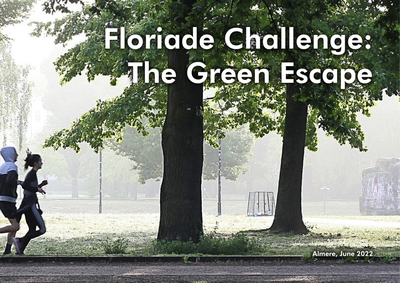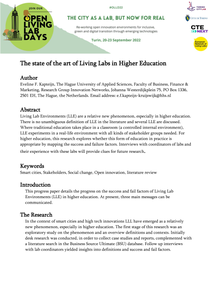Purpose: We investigated the effects of threat and trait anxiety on state anxiety and how that affects police officers’ actions during an arrest. Most experiments on police performance under anxiety test the performance of one particular skill. Yet, police work often involves concerted use of a combination of skills. Methods: We created situations – with two different levels of threat – in which officers had to choose and initiate their actions to control and arrest a non-cooperative suspect. We examined whether threat, trait anxiety and state anxiety influenced decision-making (e.g., choosing the appropriate actions) and performance (e.g., quality of communication and the execution of skills). Results: Trait anxiety affected the level of state anxiety, but not any of the decision-making and performance variables. As for decision-making, results showed that only threat determined which action officers took to gain control over the suspect. As for performance, higher levels of state anxiety were accompanied by lower scores of overall performance, communication, proportionality of applied force and quality of skill execution. Conclusion: It is concluded that state anxiety not only impairs performance of single perceptual-motor tasks, but also relevant accompanying skills such as communicating and applying appropriate force. We argue that police training should focus on an integrated set of decision-making and perceptual-motor skills and not just on the performance of isolated motor skills.
DOCUMENT
In honours programmes, teachers face the task of designing courses in which students feel challenged and learn from accomplishing demanding assignments. The aim of this study was to investigate students’ and teachers’ perceptions of challenge and learning in an honours programme. From 2016 to 2019, students and teachers rated the learning activities during the programme and explained their ratings. The results showed that in the first two years, teachers estimated challenge and learning significantly higher than the students did. However, both students and teachers viewed the tasks as the factor with the strongest impact on challenge and learning. In the first year, students also identified group dynamics as challenging and a source for learning. Enhancing task complexity and supporting group dynamics are the main factors to adjust the level of challenge in an honours programme. Monitoring students’ and teachers’ perceptions can help to adapt the programme to improve students’ learning.
MULTIFILE

Almere is a green city where the greenery extends into the centre through a framework of nature, forests, parks and canals. With this green environment, Almere fulfils an important condition for a liveable city, where it is pleasant to live and work. An important goal for the municipality is to challenge its residents to develop a healthy lifestyle by using that green framework.But what really motivates Almeerders to go outside to exercise, enjoy the surroundings and meet each other? Are there sufficient green meeting or sports facilities nearby? Could the routes that connect the living and working environment with the larger parks or forests be better designed? And can those routes simultaneously contribute to climate adaptation?With the Green Escape Challenge, we invited students and young professionals to work on these assignments together.
DOCUMENT

This paper considers the partnership model, which is in the author’s view the best answer in the social policy creation in contemporary conditions. The author refers to changes and reforms in the development of welfare state in the world from 1980s onwards. He describes various approaches and models, paying particular attention to the welfare society model, and partnership as its central concept. Furthermore, he analyses the functioning of the partnership model based on the experience of the European Union, Great Britain and Hungary
DOCUMENT

Background: The full potential of social entrepreneurship remains challenging to achieve, despite continuous efforts in various economies, including South-East Asia. Several obstacles need to be addressed, such as the scarcity of skilled employees, limited business understanding among founders, difficulties accessing funding and infrastructure, and the absence of proper social impact measurement. Higher education institutions (HEIs) often face constraints in engaging and supporting early entrepreneurial activities, exacerbating the imbalance in the social entrepreneurship landscape. This imbalance has been observed in both Thailand and Myanmar. Research objectives: The Erasmus+ funded project, STEPup, running from 2020 to 2023, recognized an opportunity to foster innovative social entrepreneurship practices tailored for disruptive business settings in these two countries. By applying the challenge-based learning approach through interactive case challenge proceedings involving social entrepreneurs, faculty mentors and students, the development of the entrepreneurial mindset of the latter group was studied. Research design and methods: To accomplish this, a multi-method research design was chosen, which involved a case-challenge experience within the framework of 6 universities, a questionnaire-based survey conducted among the student population which took part in the case-challenge experience and desk research. Results: The study revealed the necessity for a self-organizing and organic support system for social entrepreneurship. The objective of this paper is to present recommendations and strategic guidelines to enhance access and opportunities for existing social enterprises and social entrepreneurs seeking to establish and sustain a social enterprise ecosystem. The proposed framework leverages the support, expertise, and structure of existing higher education institutions. Conclusions: Higher Education Institutions can serve as excellent cases demonstrating how to design and develop resource hubs for social enterprise practitioners and engage stakeholders from all sectors to address social issues and promote awareness.
DOCUMENT

In 2015, the UN set 17 global goals, the so-called Sustainable Development Goals (SDGs) for the year 2030, “a universal call to action to end poverty, protect the planet and ensure that all people enjoy peace and prosperity”. Although these challenges are global, their impact manifests itself on a local level. An inspiring challenge for HU UAS Utrecht is to educate self-confident (upcoming) professionals who contribute to the realization of these global goals by creating local impact. In our opinion such professionals are socially involved, cope with complexity, think systemic and work trans-disciplinary. Furthermore, they ‘mix and match’ personal, societal and professional development, which will not be confined to formal education but lasts a lifetime. This complex challenge forges us to transform our thinking about education and how to organize learning, and about how, where and with whom we educate. UAS’s will have to cooperate with private, public and research partners and create communities in which all participants work, learn and develop themselves while facing new challenges.
DOCUMENT

Maintaining mental health can be quite challenging, especially when exposed to stressful situations. In many cases, mental health problems are recognized too late to effectively intervene and prevent adverse outcomes. Recent advances in the availability and reliability of wearable technologies offer opportunities for continuously monitoring mental states, which may be used to improve a person’s mental health. Previous studies attempting to detect and predict mental states with different modalities have shown only small to moderate effect sizes. This limited success may be due to the large variability between individuals regarding e.g., ways of coping with stress or behavioral patterns associated with positive or negative feelings. A study was set up for the detection of mental states based on longitudinal wearable and contextual sensing, targeted at investigating between-subjects variations in terms of predictors of mental states and variations in how predictors relate to mental states. At the end of March 2022, 16 PhD candidates from the Netherlands started to participate in the study. Over nine months, we collected data in terms of their daily mental states (valence and arousal), continuous physiological data (Oura ring) and smartphone data (AWARE framework including GPS and smartphone usage). From the raw data, we aggregated daily values for each participant in terms of sleep, physical activity, mental states, phone usage and GPS movement. First results (six months into the study at the time of writing) indicate that almost all participants show a large variability in ratings of daily mental states, which is a prerequisite for predictive modeling. Direction, strength and standard deviations of Spearman correlations between valence, arousal and the different variables suggest that several predictors of valence and arousal are more subject dependent than others. In future analyses, we will test and compare different versions of predictive modeling to highlight the potential of wearable technologies for mental state monitoring and the personalized prediction of the development of mental problems.
DOCUMENT

The “Age-Friendly Cities & Communities: States of the Art and Future Perspectives”publication presents contemporary, innovative, and insightful narratives, debates, and frameworks based on an international collection of papers from scholars spanning the fields of gerontology, social sciences, architecture, computer science, and gerontechnology. This extensive collection of papers aims to move the narrative and debates forward in this interdisciplinary field of age-friendly cities and communities. CC BY-NC-ND Book CC BY Chapters © 2021 by the authors Original book at: https://doi.org/10.3390/books978-3-0365-1226-6 (This book is a printed edition of the Special Issue Feature Papers "Age-Friendly Cities & Communities: State of the Art and Future Perspectives" that was published in IJERPH)
MULTIFILE

Introduction: Nursing students will come across stressful situations during their internships and will continue to do so in future practice. Because of the impact stress can have on performance, nursing students need to be equipped to work and collaborate in such situations. Careful consideration of the needs and desires of nursing students should be taken in account, in order to create a training environment that fosters students' ability to learn to collaborate under stress. Aim: The aim of this study is to identify viewpoints of undergraduate nursing students towards the learning of collaboration in stressful situations, to understand their needs and desires, and to improve educational designs for training to collaborate in stressful situations. Methods: We conducted a Q-methodology study, a mixed methods approach that studies and charts subjectivity, and uses a by-person factor analytical procedure to create profiles of shared viewpoints. The process of our Q-study is based on the following five steps: Q-set development (54 statements), participant selection (n = 29), Q-sorting procedure, data analysis, and factor interpretation. Results: Q-factor analysis resulted in two prevailing factors that answer our research question. Twenty-five students loaded on these two factors, and factor interpretation resulted in Profile 1 “Practice makes perfect, so let's do it” and Profile 2 “Practice is needed, but it scares me”. Whereas Profile 1 regarded learning to collaborate in stress mainly as a challenge, Profile 2 appeared anxious despite feeling the necessity to learn this. An overarching consensus factor revealed the importance of a learning environment in which mistakes can be made. Discussion: The two described profiles align with the biopsychosocial model of challenge and threat, and could help to recognize and address the individual needs of nursing students when learning to collaborate in stressful situations. Incorporating these profiles in training may guide students towards a more challenge-like appraisal of stressful situations.
DOCUMENT

Living Lab Environments (LLE) are a relative new phenomenon, especially in higher education. There is no unambiguous definition of LLE in the literature and several LLE are discussed. Where traditional education takes place in a classroom (a controlled internal environment), LLE experiments in a real-life environment with all kinds of stakeholder groups needed. For higher education, this research explores whether this form of education in practice is appropriate by mapping the success and failure factors. Interviews with coordinators of labs and their experience with these labs will provide clues for future research.
DOCUMENT
